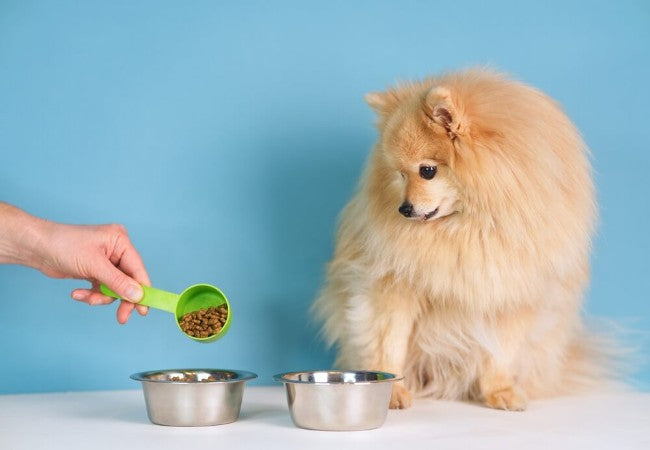Can Puppies Eat Adult Dog Food in 2025? Vet Reviewed Advice 🐶🌿

In this article
Can Puppies Eat Adult Dog Food in 2025? Vet Reviewed Advice 🐶🌿
By Dr. Duncan Houston BVSc
Feeding adult dog food to a growing puppy may seem tempting, especially with interest in natural diets. But puppies are not miniature adults—they require specific nutrients in higher amounts for healthy growth. This guide dives into when—and if—it’s safe to use adult food, alternatives like whole-food or homemade plans, and how to ensure balanced development with expert vet insight.
1. 🧬 Why Puppies Need Growth-Stage Nutrition
Puppies require higher levels of protein (≥22% DM) and dietary fat (≥8.5% DM) to fuel brain, eye, immune, and musculoskeletal development. Adults, in contrast, only need ~18% protein and ~5.5% fat.
Large-breed puppies need even stricter control of calcium, phosphorus, and calorie density to prevent orthopedic issues.
2. ✅ Risks of Early Transition to Adult Food
- Nutritional Deficits: Adult food may lack DHA, vitamin E, and calcium—leading to poor neurological growth and weak bones.
- Growth Retardation: Inadequate calories and protein may slow puppy development.
- Bone & Joint Disorders: Too much/little calcium or phosphorus—often in adult food—can cause skeletal deformities.
- Immune Weakness: Puppies exposed to pathogens need antioxidants like vitamin E—a common deficit in homemade/adult-only diets.
3. 🕒 How Long Should Puppies Eat Puppy Food?
Weaning begins at ~3–4 weeks and should be complete by 6–8 weeks. Switch to a growth formula specifically formulated for growth until:
- ~10 months for small breeds
- ~12 months for medium breeds
- 18–24 months for large and giant breeds.
4. 🌱 Natural Diet Alternatives: Whole-Food & Homemade
If you're drawn to natural diets, safe options include:
- Commercial natural/organic puppy foods labeled “complete and balanced” under AAFCO.
- Balanced homemade recipes supervised by a veterinary nutritionist—ensures correct protein, fats, calcium/phosphorus, and antioxidants.
- Raw or BARF diets: carry risk of nutrient imbalance and foodborne pathogens. Studies found common deficiencies (vitamin D, Ca:P ratios, iodine).
Even “natural” commercial foods should be AAFCO-growth approved to confirm they meet life-stage standards.
5. 🍽️ Transitioning Carefully: Best Practices
- Assess current needs: Is your puppy failing to thrive on adult food? Consult Ask A Vet.
- Choose a life-stage appropriate diet: AAFCO-labeled puppy or growth formula, whether natural or standard.
- Mix gently: Gradually blend over 7–10 days, watching for GI upset.
- Monitor growth: Weigh puppy weekly and track body condition.
- Supplement wisely: For homemade plans, include DHA, vitamin E, calcium, and prebiotics.
6. 🔄 Blending Adult Food Safely Post-Growth
- Begin when fully grown; small breeds ~10 months, large breeds 18–24 months.
- Transition gradually—over 7–10 days.
- Check that new adult food offers quality protein, healthy fats (incl. DHA), and balanced minerals.
7. 🧩 Supplementing & Natural Feeding Tools
- Ask A Vet App: Available for nutrition checks, recipe reviews, and growth advice.
8. 📊 Homemade vs Commercial: A Balanced Comparison
| Diet Type | Pros | Cons |
|---|---|---|
| AAFCO Growth Puppy Food | Complete, balanced, rigorously tested | May include additives; less “whole food” appeal |
| Natural/Organic Puppy Food | No synthetic colors, natural sourcing; AAFCO-approved | Typically higher cost |
| Balanced Homemade Diet | Wholesome, tailored; fresh ingredients | Time-consuming, requires nutritionist oversight |
| Raw/BARF Diet | Mimics ancestral diet | Pathogen risk; common nutrient imbalances |
9. 🐾 Puppy Breed & Life Stage Considerations
- Small breeds: Mature sooner—transition at ~10 months.
- Large/giant breeds: Use growth formulas with controlled minerals to support proper bone development.
- Puppies with health issues: Always consult a vet before diet changes.
10. 📌 Take-Home Points for Natural Puppy Nutrition
- Puppy growth demands higher protein, fats, DHA, vitamins—adult food doesn’t provide it.
- Use AAFCO-approved puppy food or well-balanced homemade recipes.
- Supplement naturally and monitor GI & growth patterns closely.
- Transition to adult food only after maturity, carefully and gradually.






